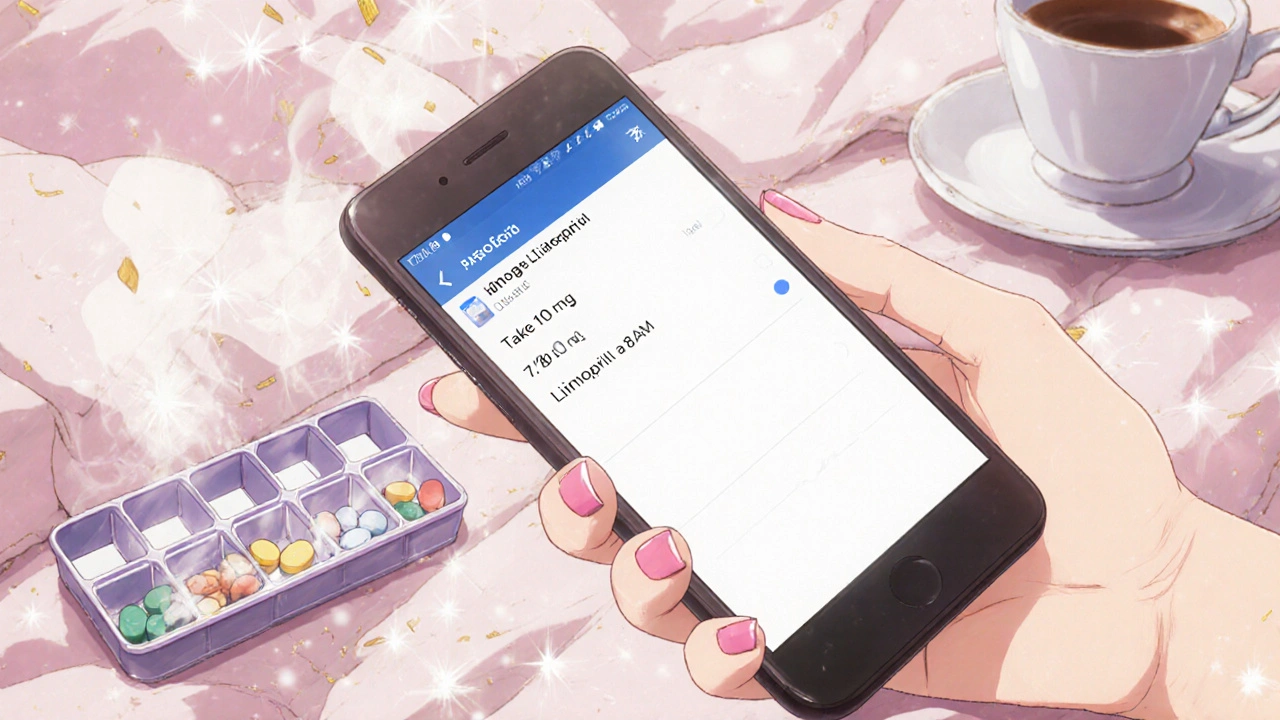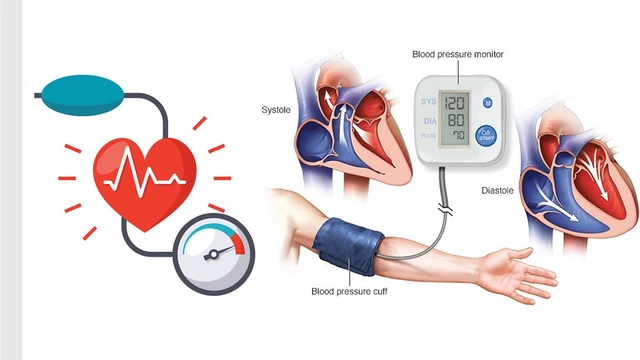
Taking your medicine every day shouldn’t feel like a chore. Yet for millions of people, it is. Whether it’s blood pressure pills, antidepressants, or insulin, sticking to a daily medication schedule is one of the biggest hurdles in managing chronic conditions. The good news? You don’t need more willpower. You need better habits.
Why Habits Beat Willpower
Willpower is finite. It runs out after a long day, when you’re tired, stressed, or distracted. But habits? Habits run on autopilot. Once a behavior becomes automatic, you don’t have to think about it. That’s the goal with medication: turn it from something you remember to do into something you do without remembering. Research shows that about half of people with long-term illnesses miss doses at some point. That’s not laziness. It’s not carelessness. It’s a system problem. Your brain didn’t evolve to track 3 different pills at 3 different times a day. But it did evolve to follow routines-like brushing your teeth, making coffee, or checking your phone in the morning. The key is to link your medication to an existing habit. This is called habit stacking. It’s not magic. It’s neuroscience.Start with the Simplest Trick: Tie It to an Existing Routine
Pick one daily action you never skip. Brushing your teeth? Morning coffee? Sitting down for breakfast? That’s your anchor. Do this: Right after you brush your teeth, take your pill. Not before. Not later. Right after. Do it every single day. No exceptions. Why does this work? Your brain starts linking the two actions. Over time, the act of picking up your toothbrush triggers the urge to take your pill. You don’t have to remind yourself-you just do it. A 2020 study in Patient Preference and Adherence found that people who tied their meds to a daily routine improved adherence by 15.8%. Try this with other routines too:- Take your afternoon pill when you sit down for lunch.
- Take your night pill right after you turn off the bedside lamp.
- Take your weekly dose when you load the washing machine.
Use a Pill Organizer-But Only If It Fits Your Life
Pill organizers aren’t magic boxes. They’re tools. And like any tool, they only work if you actually use them. If you take 3 pills a day, get a 7-day organizer with morning, afternoon, and night slots. Fill it once a week. When you see an empty slot, you know you missed a dose. That visual cue is powerful. But if you’re forgetful or have a messy routine? A weekly organizer might just become another thing you forget to fill. In that case, skip it. Instead, use your phone. A 2021 meta-analysis in JMIR mHealth and uHealth found that smartphone reminders boosted adherence by 28.7%. The trick isn’t just setting a reminder-it’s setting the right one. Use a sound you can’t ignore. Label it clearly: “AM Blood Pressure.” Don’t just say “Medicine.” Make it specific. Better yet? Use an app that tracks your progress. Seeing a streak of 10 days in a row? That feels good. Seeing a gap? That’s your cue to adjust.Make It Easier Than Ever to Take Your Meds
One of the biggest reasons people skip doses? Complexity. If you’re juggling 5 different pills at 3 different times, your brain gets overloaded. That’s why simplifying your regimen is one of the most effective strategies. Ask your doctor or pharmacist: Can any of these be combined into a single pill? Can I take this twice a day instead of three times? Can I switch to a long-acting version? A 2011 meta-analysis of over 21,000 patients showed that single-pill combinations increased adherence by 26%. That’s not a small win. That’s life-changing. Even small changes help. If you’re supposed to take a pill with food but you often skip meals, ask if you can take it on an empty stomach instead. If you hate swallowing pills, ask if there’s a liquid or patch form. The goal isn’t to be perfect. It’s to be consistent. Make the path of least resistance the right one.
Track It-But Don’t Punish Yourself
Tracking your medication isn’t about guilt. It’s about awareness. Keep a simple log. Just a calendar. Mark an X every day you take your meds. No fancy apps needed. Just pen and paper. Why does this work? Because humans are visual creatures. Seeing a chain of X’s builds momentum. You don’t want to break it. That’s the power of the “don’t break the chain” rule popularized by Jerry Seinfeld. But here’s the catch: If you miss a day, don’t start over. Don’t call yourself lazy. Don’t feel guilty. Just mark the missed day and keep going. Progress isn’t linear. Habit formation isn’t about perfection-it’s about persistence. A 2005 study in Psychiatry Research found that patients who tracked their medication adherence improved their adherence by 19.3% over time. The act of recording, not the score, made the difference.Use Incentives-Not Just for Rewards, But for Identity
Reward systems work-but only if they’re tied to how you see yourself. Don’t say: “I’ll buy myself a coffee if I take my pills all week.” That’s a transaction. It doesn’t stick. Say instead: “I’m the kind of person who takes care of their health.” That’s identity-based motivation. It’s deeper. It lasts. Every time you take your pill, say it out loud: “I’m taking my blood pressure pill because I’m someone who shows up for myself.” This isn’t fluff. It’s cognitive behavioral therapy in action. A 2022 study in Behavioral Health News showed that patients who used identity-based language improved adherence by 22% compared to those who only used external rewards. You can also use small, real rewards. A $5 gift card after a week of perfect adherence. A movie night after 30 days. But make sure the reward comes after the behavior-not before.Get Help-But Not Just From Doctors
You don’t have to do this alone. Pharmacists are trained to help with adherence. They can simplify your regimen, explain side effects, and even set up automatic refills. Ask your pharmacy if they offer auto-refill programs. Research shows they improve continuity by 33.4%. Family members can help too. Tell someone you trust: “I’m trying to build a habit of taking my meds. Can you check in with me once a week?” Just a quick text: “Did you take your pill today?” can make a huge difference. For people with mental health conditions, structured programs like the ADAPT program (Adherence through Dynamic Assessment, Planning, and Teaching) have shown 78% adherence rates-compared to 52% in standard care. These programs combine counseling, personalized planning, and ongoing support. And if cost is a barrier? Talk to your doctor. Many drug manufacturers offer patient assistance programs. Some pharmacies have discount cards. Skipping doses because you can’t afford meds isn’t adherence-it’s a system failure. And it’s fixable.
What Doesn’t Work
Not all “adherence tools” are created equal. Pill organizers alone? They help-but only if you use them consistently. A 2021 study found they improved adherence by just 8.4% when used alone. Generic reminders? “Take medicine” isn’t enough. You need specificity: “Take 10 mg Lisinopril at 8 AM.” Guilt trips? “You’re going to have a stroke if you keep skipping pills” doesn’t motivate. It paralyzes. Overcomplicating? If your plan requires 5 steps, you won’t stick to it. Simplicity wins.Start Small. Stay Consistent.
You don’t need to fix everything at once. Pick one pill. One time of day. One habit to stack it with. Master that. Then add another. If you’re taking 4 pills a day, start with the one that matters most. Maybe it’s your blood pressure pill. Maybe it’s your antidepressant. Focus on that one first. Use your phone. Set a reminder. Tie it to brushing your teeth. Write it down. Say it out loud. In 30 days, you won’t be thinking about it. You’ll just do it. That’s the power of behavioral tricks. Not willpower. Not discipline. Just smart, simple, repeatable actions that turn medicine into routine.When You Slip Up
You will miss a dose. Maybe more than once. That’s normal. Don’t restart. Don’t punish yourself. Just ask: What changed? Were you traveling? Did your routine get disrupted? Were you sick? Did the pill bottle run out? Then fix the system-not your willpower. If you travel often, get a travel pill case. If you run out of pills, sign up for auto-refill. If you forget when you’re sick, leave a note on your mirror. Every slip is a clue. Not a failure.Final Thought: This Isn’t About Compliance. It’s About Control.
Taking your medication isn’t about following orders. It’s about choosing to stay in charge of your health. Every time you take your pill, you’re saying: “I’m not letting this condition win.” You don’t need to be perfect. You just need to be consistent. Start small. Stack it. Track it. Keep going. Your future self will thank you.What’s the most effective behavioral trick for medication adherence?
The most effective trick is habit stacking-tying your medication to an existing daily routine like brushing your teeth or eating breakfast. Research shows this improves adherence by up to 15.8%. When the action becomes automatic, you no longer rely on memory or willpower.
Can smartphone reminders really help me take my pills?
Yes. A 2021 meta-analysis of over 12,000 people found smartphone reminders improved adherence by 28.7%. The key is customization: use clear labels like “Take 10 mg Lisinopril at 8 AM” and set a sound you can’t ignore. Generic reminders like “Take medicine” are far less effective.
Should I use a pill organizer?
Only if it fits your life. Pill organizers help reduce missed doses by 27% in older adults-but they only work if you fill them regularly. If you’re forgetful or have a busy schedule, a phone app or auto-refill system might be better. The goal is simplicity, not complexity.
What if I can’t afford my medication?
Cost is one of the biggest barriers to adherence. Talk to your pharmacist or doctor-they can help you find patient assistance programs, generic alternatives, or discount cards. Skipping doses because of cost doesn’t save money-it leads to worse health outcomes and higher medical bills later.
How long does it take to build a medication habit?
It varies, but most people start seeing automatic behavior after 21 to 30 days of consistent action. Don’t aim for perfection. Aim for consistency. Missing one day doesn’t reset the clock-just keep going. The goal is to make it so routine that you don’t have to think about it.
Can behavioral techniques work for mental health medications?
Yes. Studies show that combining behavioral strategies like motivational interviewing, habit stacking, and identity-based messaging improves adherence for mental health medications by up to 29.8%. Programs like ADAPT and CBT-based adherence training have shown success in reducing hospitalizations and improving symptoms in patients with conditions like bipolar disorder and schizophrenia.
What should I do if I keep forgetting even with reminders?
If reminders aren’t enough, look at your environment. Are your pills visible? Are they stored where you’ll see them? Try placing your pill bottle next to your toothbrush, coffee maker, or car keys. Also, ask a family member to check in. Sometimes, external accountability makes the difference.





There are 13 Comments
David Rooksby
Okay but have you ever considered that Big Pharma doesn't want you to build habits? They profit off you being confused, forgetting doses, and needing more prescriptions. That’s why they push apps and pill organizers-distractions to keep you dependent. The real solution? Stop trusting corporations and start trusting your body’s natural rhythm. They don’t teach you this in med school because it doesn’t sell.
Rachel Wusowicz
...I’ve been stacking my pills with my morning tea... but I swear... the pills... they... *whisper*... change color when I’m not looking... I think they’re monitoring me... through the bottle... I’ve seen it... three times... it’s not my imagination...
...and why does the bottle say ‘take with food’... but the label in the box says ‘take on empty stomach’...?... WHO CHANGED IT?!...
...I think they’re testing us... with the dosing...
...I stopped taking them last week... and my dreams got... clearer...
...I’m not paranoid... I’m PREPARED...
...I’m recording everything... in my journal... with colored pens... the red ones mean ‘danger’...
...I think the pharmacist knows... I saw him nodding at the security camera...
...I’m not taking them anymore... I’m doing a ‘reset’...
...if you’re reading this... you’re already part of the system...
...don’t trust the X’s on your calendar... they’re not real...
...I’ve started writing letters to the moon... it listens...
...I’m not crazy... I’m just the only one awake...
...you’re welcome...
...ps: I’m still alive... so... they didn’t kill me... yet...
Latrisha M.
This is one of the most practical, science-backed pieces I’ve read on medication adherence. No fluff. No guilt. Just clear, human-centered strategies. Habit stacking works because it’s anchored in neurobiology-not willpower. The ‘don’t break the chain’ method? Brilliant. Simple. Sustainable. I’ve used this with patients for years. No need for apps or fancy tools. Just consistency. And compassion. You don’t need to be perfect. You just need to show up. Again. And again. And again. That’s how change happens.
Danish dan iwan Adventure
Behavioral tricks? You're talking about operant conditioning with a veneer of self-help. The real issue is pharmacokinetic non-compliance due to polypharmacy in aging populations. The solution isn't habit stacking-it's deprescribing. Reduce the regimen. Eliminate redundant meds. The 26% adherence boost from single-pill combos? That's because you cut the cognitive load. Not because you brushed your teeth.
Deepak Mishra
OMG I JUST REALIZED I’VE BEEN TAKING MY PILLS AFTER SHOWERING NOT BRUSHING MY TEETH 😭😭😭 THIS EXPLAINS EVERYTHING!! I’VE BEEN MISSING THEM FOR 3 MONTHS BECAUSE I’M A MESS!! I’M GOING TO DO IT RIGHT NOW!! 🙏🙏🙏 I’M SO EMOTIONAL THIS IS LIKE A REVELATION!! I’M CRYING!! 😭💖 #HabitStackingIsLife #PillRoutineGlowUp
ZAK SCHADER
Why are we letting some guy in a lab coat tell us how to take pills? We used to just take them when we felt like it. Now we got apps and calendars and streaks? This is what happens when you let the woke elites run healthcare. I take my meds when I remember. If I forget? Maybe my body doesn’t need them. Simple. American. No guilt. No tracking. No apps. Just common sense.
John Mwalwala
Let me drop some neuroplasticity jargon on you: cue-routine-reward loops are hardwired into the basal ganglia. Habit stacking exploits the dorsal striatum’s associative learning pathways. The 15.8% adherence boost? That’s dopamine reinforcement via contextual conditioning. You’re not ‘remembering’-you’re triggering a conditioned response. The toothbrush is the conditioned stimulus. The pill is the response. The reward? Avoiding a stroke. Simple. Elegant. Biological. No willpower required.
Ankit Right-hand for this but 2 qty HK 21
This is why India and China are winning. We don’t need apps or streaks. We have family. We have community. You people in the West are so isolated you think you need a reminder to take a pill. My grandmother took her BP meds every day at 7 AM because her daughter reminded her. No phone. No organizer. Just love. You’re overcomplicating a simple act because you’ve lost your village. Fix that. Not your pill box.
Oyejobi Olufemi
Do you realize the psychological warfare behind this? The entire narrative of ‘habit stacking’ is a capitalist illusion designed to make you believe you’re in control when you’re actually being manipulated by corporate wellness culture. They sell you apps, then sell you supplements to ‘enhance adherence,’ then sell you therapy to cope with the guilt of failing their impossible standards. You’re not building a habit-you’re becoming a data point. Wake up. The system wants you dependent, not empowered.
Daniel Stewart
There’s a deeper existential layer here, isn’t there? Taking medication daily is a quiet act of faith-in your future self, in the possibility of continuity, in the idea that tomorrow matters enough to prepare for. It’s not about compliance. It’s about dignity. The ritual of it, the repetition, the small, daily affirmation: I am still here. I am still trying. That’s the real medicine.
Jamie Watts
Y’all are overthinking this. Just put your pills next to your coffee maker. Take 'em when you make your cup. Done. No apps. No journals. No identity talk. I’ve been on 5 meds for 12 years. I don’t remember the names. I just know where the bottle is. If I miss one? I take it when I remember. Life’s too short to be a pill robot. You’re not a patient. You’re a human. Be one.
Melanie Taylor
I tried the toothbrush trick and it WORKED!! 😊 I now take my meds right after I brush and I haven’t missed a day in 47 days!! 🎉 I even made a little glitter sticker chart!! 🌟 My therapist said I’m ‘engaging in positive self-reinforcement’ which is just a fancy way of saying I’m being cute and consistent!! 💖 You guys are the best!! This post changed my life!! 🙌 #MedicationMilestone #PillAndPrincess
Teresa Smith
While the behavioral strategies outlined here are empirically valid, they presuppose a level of cognitive and socioeconomic privilege that is not universally accessible. For individuals experiencing housing instability, food insecurity, or untreated mental illness, the notion of ‘habit stacking’ is not merely impractical-it is insulting. True systemic change requires not just behavioral nudges, but equitable access to medication, affordable healthcare, and social support infrastructure. Without these, even the most elegant habit is a luxury.
Write a comment
Your email address will not be published. Required fields are marked *